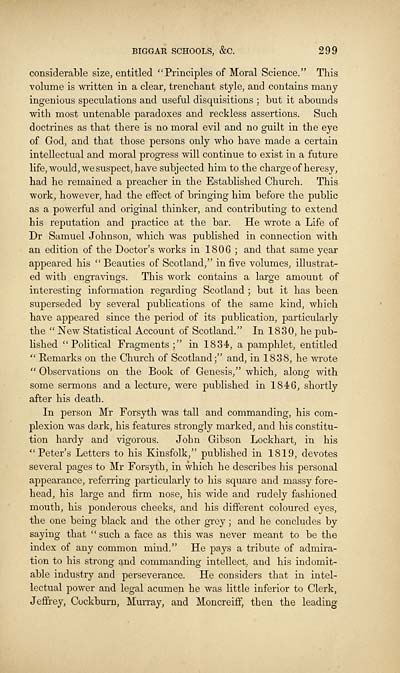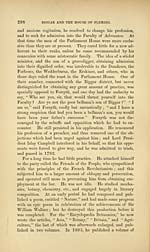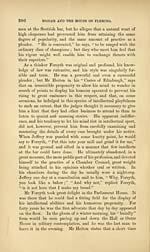Biggar and the House of Fleming
(329) Page 311
Download files
Complete book:
Individual page:
Thumbnail gallery: Grid view | List view

BIGGAR SCHOOLS, &C. 299
considerable size, entitled "Principles of Moral Science." This
volume is written in a clear, trenchant style, and contains many
ingenious speculations and useful disquisitions ; but it abounds
with most untenable paradoxes and reckless assertions. Such
doctrines as that there is no moral evil and no guilt in the eye
of God, and that those persons only who have made a certain
intellectual and moral progress will continue to exist in a future
life, would, we suspect, have subjected him to the charge of heresy,
had he remained a preacher in the Established Church. This
work, however, had the effect of bringing him before the public
as a powerful and original thinker, and contributing to extend
his reputation and practice at the bar. He wrote a Life of
Dr Samuel Johnson, which was published in connection with
an edition of the Doctor's works in 1806 ; and that same year
appeared his " Beauties of Scotland," in five volumes, illustrat-
ed with engravings. This work contains a large amount of
interesting information regarding Scotland ; but it has been
superseded by several publications of the same kind, which
have appeared since the period of its publication, particularly
the " New Statistical Account of Scotland." In 1830, he pub-
lished "Political Fragments;" in 1834, a pamphlet, entitled
" Remarks on the Church of Scotland;" and, in 1838, he wrote
" Observations on the Book of Genesis," which, along with
some sermons and a lecture, were published in 1846, shortly
after his death.
In person Mr Forsyth was tall and commanding, his com-
plexion was dark, his features strongly marked, and his constitu-
tion hardy and vigorous. John Gibson Lockhart, in his
"Peter's Letters to his Kinsfolk," published in 1819, devotes
several pages to Mr Forsyth, in which he describes his personal
appearance, referring particularly to his square and massy fore-
head, his large and firm nose, his wide and rudely fashioned
mouth, his ponderous cheeks, and his different coloured eyes,
the one being black and the other grey ; and he concludes by
saying that "such a face as this was never meant to be the
index of any common mind." He pays a tribute of admira-
tion to his strong and commanding intellect, and his indomit-
able industry and perseverance. He considers that in intel-
lectual power and legal acumen he was little inferior to Clerk,
Jeffrey, Cockburn, Murray, and Moncreiff, then the leading
considerable size, entitled "Principles of Moral Science." This
volume is written in a clear, trenchant style, and contains many
ingenious speculations and useful disquisitions ; but it abounds
with most untenable paradoxes and reckless assertions. Such
doctrines as that there is no moral evil and no guilt in the eye
of God, and that those persons only who have made a certain
intellectual and moral progress will continue to exist in a future
life, would, we suspect, have subjected him to the charge of heresy,
had he remained a preacher in the Established Church. This
work, however, had the effect of bringing him before the public
as a powerful and original thinker, and contributing to extend
his reputation and practice at the bar. He wrote a Life of
Dr Samuel Johnson, which was published in connection with
an edition of the Doctor's works in 1806 ; and that same year
appeared his " Beauties of Scotland," in five volumes, illustrat-
ed with engravings. This work contains a large amount of
interesting information regarding Scotland ; but it has been
superseded by several publications of the same kind, which
have appeared since the period of its publication, particularly
the " New Statistical Account of Scotland." In 1830, he pub-
lished "Political Fragments;" in 1834, a pamphlet, entitled
" Remarks on the Church of Scotland;" and, in 1838, he wrote
" Observations on the Book of Genesis," which, along with
some sermons and a lecture, were published in 1846, shortly
after his death.
In person Mr Forsyth was tall and commanding, his com-
plexion was dark, his features strongly marked, and his constitu-
tion hardy and vigorous. John Gibson Lockhart, in his
"Peter's Letters to his Kinsfolk," published in 1819, devotes
several pages to Mr Forsyth, in which he describes his personal
appearance, referring particularly to his square and massy fore-
head, his large and firm nose, his wide and rudely fashioned
mouth, his ponderous cheeks, and his different coloured eyes,
the one being black and the other grey ; and he concludes by
saying that "such a face as this was never meant to be the
index of any common mind." He pays a tribute of admira-
tion to his strong and commanding intellect, and his indomit-
able industry and perseverance. He considers that in intel-
lectual power and legal acumen he was little inferior to Clerk,
Jeffrey, Cockburn, Murray, and Moncreiff, then the leading
Set display mode to:
![]() Universal Viewer |
Universal Viewer | ![]() Mirador |
Large image | Transcription
Mirador |
Large image | Transcription
Images and transcriptions on this page, including medium image downloads, may be used under the Creative Commons Attribution 4.0 International Licence unless otherwise stated. ![]()
| Histories of Scottish families > Biggar and the House of Fleming > (329) Page 311 |
|---|
| Permanent URL | https://digital.nls.uk/94843230 |
|---|
| Description | A selection of almost 400 printed items relating to the history of Scottish families, mostly dating from the 19th and early 20th centuries. Includes memoirs, genealogies and clan histories, with a few produced by emigrant families. The earliest family history goes back to AD 916. |
|---|

